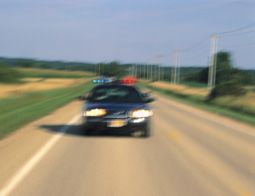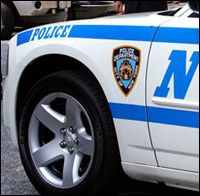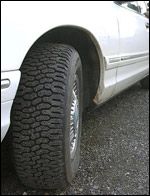By Police1 columnist Travis Yates
 |
A properly inflated tire is essential for safety, fuel mileage, handling and tire longevity. The air in a LE officer’s tires is the lifeline between the officer’s car and the ground. The tire is the only item on the car that touches the roadway, which means a properly inflated tire is vital to officer safety.
While regular checks of the tires are essential to ensure the proper air pressure, research tells us that most drivers do not check their tire pressure often enough to prevent the under-inflation of tires. In fact, per the Rubber Manufacturers Association, only one in five motorists checks tire pressure on a regular basis.
According to Broken Arrow (OK) Sergeant John Zoller, a driver training program coordinator, “Tire pressure is a major issue with officers. We are horrible about checking the air pressure in our tires.”
Much of the problem lies with the visual checking of tires. While officers will typically look at their tires each day, it is very difficult to determine a lack of air pressure without manually checking. A tire can be as much as 50% under-inflated and retain a normal appearance.
Temperature changes can make it even more difficult to maintain the proper air pressure. Pressure in a tire can go up in warm weather and down in cold weather as much as two pounds for every 10 degrees of temperature change. Even if the temperatures are constant, air will escape through tires at a rate of approximately 1-2 pounds per square inch (psi) per month.
To maximize safety, LE must ensure that they are addressing this issue. While taking the time each day to actually check the pressure with a gauge would eliminate the problems, another product has entered the mainstream market that would be a huge benefit for LE and their vehicle safety.
Nitrogen
 (AP Photo/Mary Altaffer) |
Nitrogen has been used for many years in the tires of commercial vehicles, aircraft and race cars. Precise tire pressure despite temperature and environmental changes are vitally important to these industries, and nitrogen has eliminated the rapid loss of pressure that comes with using air.
Nitrogen molecules are larger and less permeable than ambient air, and it will migrate much more slowly through a tire. Nitrogen will resist heat buildup much better than air, and will reduce oxidation which can damage tires from the inside. Air also contains moisture, so not only does air constantly leave a tire; it reacts with the rubber within the tire which can cause the tire to lose durability.
While the Rubber Manufacturers Association has endorsed the use of nitrogen, the National Highway Traffic Safety Administration (NHTSA) has not yet rendered an opinion on nitrogen (however they do lament the benefits of a properly inflated tire and warn of the dangers in an under-inflated tire). NHTSA will soon form an opinion. They are currently conducting tests on the use of nitrogen for passenger cars. The studies, due out in late spring, will investigate the aging of tires and the rate of pressure loss in tires.
Sergeant Zoller of Broken Arrow believes so much in the benefits of nitrogen, he put it in his personal vehicle. After spending $20 to get his Jeep tires inflated with nitrogen, he has not seen any fluctuation with the pressure in eight months.
“I really have a peace of mind knowing that my family is much safer. While I checked the air pressure on a regular basis before nitrogen, I now know that despite any temperature or tire changes, the pressure in the tires will remain constant.”
 (AP Photo/Toby Talbot) |
Sergeant Zoller believes that nitrogen provides a huge benefit for LE agencies, “We really should look at nitrogen for our fleet of vehicles and specifically within law enforcement. The increased savings in gas mileage and tire wear would certainly prove its worth in time.” Zoller adds that, “for a patrol car to turn corners at high speed and not check air pressure is a recipe for disaster. Nitrogen certainly takes the guessing game out of that.”
The United States Department of Energy states that motorists can improve their gas mileage by as much as 3.3% by keeping their tires properly inflated. Tom Kellam, the Operations Manager for Discount Mike’s Tires & Automotive in Oklahoma, says that he has had several customers using nitrogen notice an increase in gas mileage. “A three percent increase is very possible and in a large fleet of vehicles, just a one percent savings can be huge.”
While many tout the benefits of using nitrogen — and few would argue that an increase in gas mileage as well as improved handling and tire wear would greatly benefit a police fleet — few U.S. LE agencies currently use nitrogen in their fleets.
Why? Nitrogen is still not widely available, and the initial cost for a department would likely scare them away. Nationwide, less than 10% of tire dealers offer nitrogen as an option. The start-up cost of a nitrogen machine is between $3500 and $15,000, depending on the size of fleet for which it’s purposed. While some machines will pull the nitrogen out of the air (air contains 78% nitrogen), others use nitrogen tanks which are generally inexpensive after the initial cost.
Sergeant Zoller believes that it is time for LE to embrace nitrogen. “I know it may sound crazy to some but just because it’s not being done now doesn’t mean it isn’t a good idea. Yes, there is some cost involved, but agencies will see benefits down the line in fuel savings, tire wear and ultimately safety.”
The Kingsport (Tennessee) Police Department recently started using nitrogen in their vehicle tires. Kingsport Officer Tom Wayt has had nitrogen in his tires for six months. “Since I’ve had the nitrogen in my tires, I’ve never had to touch the tires,” he says. The city is citing preliminary data showing not only better gas mileage but better wear on the tires.
Some will argue that nitrogen is not the answer and officers should simply check their tires on a regular basis to prevent an under-inflated tire and the subsequent dangers. While this practice is advisable, the daily demands and rigors of LE will likely prevent daily checks of tire pressure for many.
Nitrogen appears to help LE and the public with an obvious problem in vehicle safety. There is an initial cost but there is also the potential of a savings down the line — of money and lives. The NHTSA report will be out soon and LE should continue to do what it can to give officers the safest environment as possible. If nitrogen is part of that, I simply couldn’t argue against it.
Additional Information
www.getnitrogen.org











